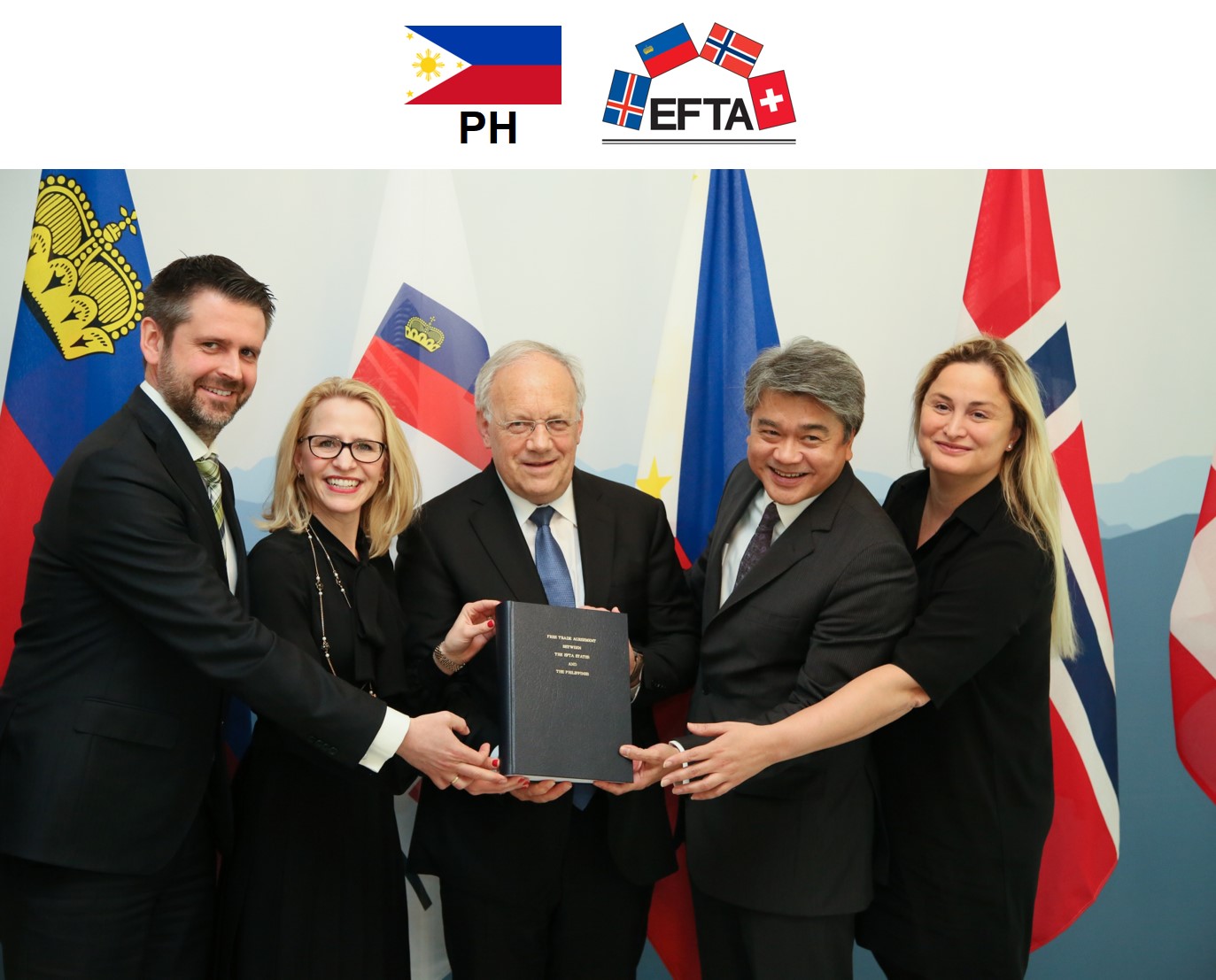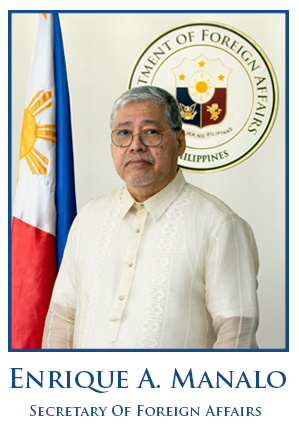
I. Trade in Goods
a. Text – The trade in goods related provisions1 of the FTA incorporates the existing WTO rules and obligations with respect to areas governing trade in goods. However, additional disciplines were agreed by both sides on export duties, quantitative restrictions, subsidies and countervailing measures, global safeguard measures and modification of concessions.
b. Market Access – While market access on industrial and fishery products were negotiated with the Philippines by the EFTA Member States as a bloc, agricultural market access was negotiated bilaterally
Upon entry into force, EFTA Member States will accord duty-free market access to all industrial and fishery products from the Philippines.
In addition, the Philippines gained significant concessions on agricultural products particularly those: (1) that are currently being exported to the EFTA Member States, such as desiccated coconut, prepared or preserved pineapples, and raw cane sugar; and (2) with high potential export interest such as tropical fruit wine. This includes those that are currently being exported by the Philippines to the European Union, which can alternately be exported to EFTA.
On the other hand, the Philippines will provide all EFTA Member States duty-free market access (based on different timeframes for tariff elimination) on most industrial and fishery products. A number of fisheries and industrial tariff lines were excluded from any tariff liberalization commitment.
On agriculture, the Philippines granted the EFTA Member States market access (on a bilateral basis) on a number of goods such as temperate fruits, mineral and aerated waters, food preparations, chocolate, cheese and wine, among others.
Under rules of origin, the Philippines was also able to negotiate liberal requirements for products of export interest such as fishery products and garments, to qualify for preferential treatment. To further facilitate the export of goods and the claim for preferential treatment, the exporter will no longer need to secure a certificate of origin from the customs authorities. Instead, the exporter can issue an origin declaration stating that it has complied with the rules of origin under the Agreement. The Parties can provide advance rulings on tariff classification, applied rates of duty, valuation method, fees and charges, port of entry requirements and rules of origin.
II. Services
The Chapter is generally consistent with the rules and obligations under the WTO with respect to trade in services. It includes separate annexes on: (1) Financial Services; (2) Telecommunications Services; (3) Movement of Natural Persons Supplying Services; (4) Maritime Transport and Related Services; and (5) Energy Related Services.
EFTA Member States made offers in new services sectors/subsectors and improved on their existing mode 4 commitments under the GATS. Offers in cross-border supply of services (mode 1) and movement of natural persons (mode 4) present opportunities available to Philippine services suppliers (both skilled workers and professionals) particularly for architects and engineers. Entry and temporary presence of intra-corporate transferees (covering executives/managers and specialists), business visitors and contractual service suppliers will be allowed in some or all EFTA member states, as applicable. Switzerland offered an additional category of installers and maintainers. Norway will also allow independent professionals and graduate trainees to supply services on a temporary basis. The movement of natural persons is in the context of Philippine companies fulfilling contracts to supply services and not individuals seeking employment in the EFTA Member States and vice versa. Through this FTA, the maintenance and repair of Swiss aircraft may now be done in the Philippines (Mode 2).
The Philippines offered improved market access to EFTA Member States in service sectors where additional investments and technical expertise from EFTA are deemed beneficial to the country. These sectors include renewable energy, computer and related services (IT-BPM), construction, environmental services, maritime transport, and finance.
Entry and temporary stay of service suppliers from EFTA member states, without undergoing the economic needs test* is also allowed in the following categories: (i) intra-corporate transferees (covering executives/managers, specialists), (ii) business visitors, (iii) contractual service suppliers and (iv) installers and servicers of industrial machinery, equipment or both. The latter will be part of the contract of purchase of the said machinery or equipment and includes the contractual requirement to develop local skills through training of the juridical person in the Philippines.
The Philippine commitments are aligned with existing laws, rules and regulations. These are an improvement compared with existing commitments under the GATS.
III. Investment
The Parties shall endeavor to provide a stable, non-discriminatory, and transparent investment conditions for investors of EFTA and Philippines in their respective territories and admit investments in accordance with the laws and regulations of the Parties. Under the FTA, the Parties also recognize that it is inappropriate to lower health, safety or environmental standards for the sole purpose of encouraging investments.
The Parties share a commitment to promote and facilitate investment flows and identify ways to accomplish such objective. The Parties also affirm their commitment to review investment-related issues in the Joint Committee, including the right of establishment of investors of a Party in the territory of another Party, no later than five (5) years after the entry into force of the Agreement.
IV. Government Procurement
The Parties shall continue efforts to improve understanding of each Parties’ government procurement laws and regulations with a view to progressively liberalizing their respective markets. If a Party grants to a non-party additional market access in government procurement, the Philippines and EFTA will enter into negotiations to extend similar benefits under the FTA.
The Parties consider the possibility of developing their commitments in government procurement within three years after entry into force of the FTA.
V. Intellectual Property Rights (IPRs)
The Parties reaffirm their obligations in multilateral agreements to which the Philippines and the EFTA Member States are parties to. The Parties shall also comply with the substantive provisions of a number of relevant international agreements.
With respect to the scope and protection of intellectual property, the provisions of the FTA are consistent with Philippine laws, rules and regulations. The FTA also includes provisions on enforcement and cooperation between the Parties.
VI. Competition
The Parties shall cooperate and consult in dealing anti-competitive practices with the view to end such practices or its adverse effects on trade.
VII. Trade and Sustainable Development
The Parties agreed not to weaken, reduce or derogate from the levels of environmental or labor protection provided for in its respective laws, rules and regulations with the sole intention to encourage investment or to enhance competitive trade advantage. The provisions under this Chapter ensure that the economic objectives of the FTA will be achieved through sustainable means.
Both sides likewise agreed that the Chapter will not be subject to arbitration but rather through consultations towards the attainment of mutually satisfactory resolution/s.
1 The FTA includes chapters on non-agriculture products, agriculture products, sanitary and phytosanitary measures, technical barriers to trade and annexes on rules of origin, trade in fish and other marine products and trade facilitation.


